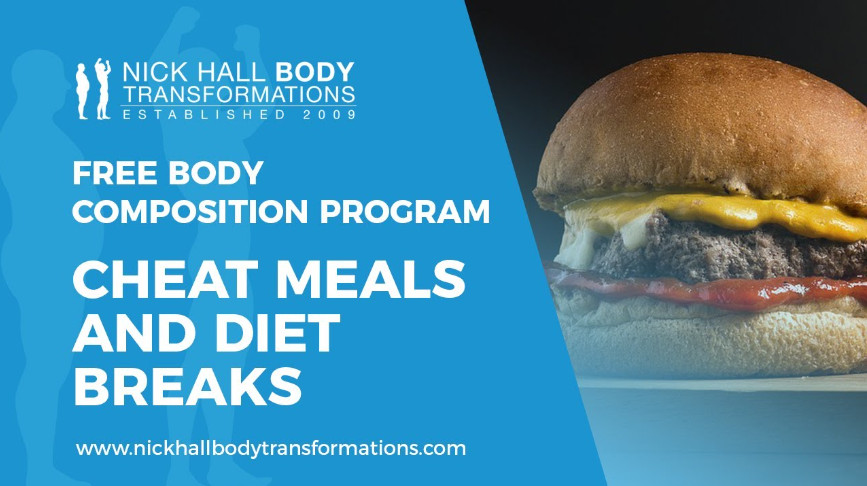we delivers enough to blog about

Cheat meals and diet breaks
In today’s post we’re discussing how to incorporate cheat meals into your week without going over your calorie allowance.
We are also going to discuss where diet breaks fit into your program.
One of the keys to success in any kind of diet is sustainability. You can’t diet hard for ever. You also need to have a life. Most of you reading this email won’t’ be in the middle of a contest prep.
Below is a real life example of how I incorporated cheat day or refeed day into a clients week. This particular client, lets call her Jane (not her real name) was happy to follow her diet from Sunday to Friday however still wanted to catch up with friends and be social on Saturday.
Jane’s calorie amount was 1800 per day x 7 days = 12,600 per week. Jane wanted to have Saturday as a day where she could go out for lunch and dinner and not be worried about going over her calorie intake. In order to do this we were able to slightly reduce her Sunday to Friday calorie intake to 1600 calories x 6 days = 9600. This leave 3000 calories on Saturday she can consume and still be within her calorie limit for he week. She then needs to make sure to get back on track the following day.
One of the advantages of planning a refeed day is that you know in the back of your mind that you can relax your diet and not undo all your hard work. It also helps make following a diet more sustainable. You also don’t want to be that annoying person who can’t go out or can’t eat here or there because they are on a diet.
Diet breaks are slightly different. They are usually a week or more in duration.
Overtime your metabolism or calories burnt slows while dieting. This is referred to as metabolic adaptation. This means as your calories decrease, your exercise goes up you will find it harder to lose body fat.
Your metabolic rate or calorie expenditure can drop from anywhere between 15-30% when you are in a decent calorie deficit.
Letpin levels also drop as you diet and lose weight. Leptin controls hunger, fat loss and fat gain. When you’re in a calorie deficit your thyroid levels also drop. Ghrelin which is also a hunger hormone increases as you diet which means your appetite increases. Cortisol levels also can increase while dieting and training on low calories.
The aim of a refeed is to raise your letpin levels and your metabolic rate to encourage further fat loss. You should also train on refeed days as you’ll be more anabolic from the increase in food. The increase in calories will help you train harder.
A rough rule of thumb is to reduce protein to maintenance levels, reduce fat by 10-20% and then increase carbs to the remaining level of your calorie allowance.
In my one on one program I incorporate diet breaks into my clients programs at regular intervals.
One particular study called the MATADOR study which is linked below found that greater weight and fat loss was achieved through intermittent dieting. This was conducted in a two week on diet followed by a two week diet break at maintenance levels. The intermittent dieting group also maintained weight loss longer over a six month period that the non-intermittent dieting group.
In summary, scheduling in a refeed day or refeed week can definitely help keep you on track and prevent you from hitting a plateau over a longer period of dieting.
Our next blog post is on carbs and sugar which you can view here
References
Metabolic adaptation to weight loss: implications for the athlete.
https://www.ncbi.nlm.nih.gov/pmc/articles/PMC3943438/
Metabolic slowing with massive weight loss despite preservation of fat-free mass.
https://www.ncbi.nlm.nih.gov/pubmed/22535969
Long-term persistence of adaptive thermogenesis in subjects who have maintained a reduced body weight.
https://www.ncbi.nlm.nih.gov/pubmed/18842775
Greater than predicted decrease in energy expenditure during exercise after body weight loss in obese men.
https://www.ncbi.nlm.nih.gov/pubmed/12617720
Moderate weight loss is sufficient to affect thyroid hormone homeostasis and inhibit its peripheral conversion.
https://www.ncbi.nlm.nih.gov/pubmed/23902316
Weight loss increases circulating levels of ghrelin in human obesity.
https://www.ncbi.nlm.nih.gov/pubmed/11874411
Sex hormone changes during weight loss and maintenance in overweight and obese postmenopausal African-American and non-African-American women.
https://www.ncbi.nlm.nih.gov/pmc/articles/PMC3635052/
Effects of short-term carbohydrate or fat overfeeding on energy expenditure and plasma leptin concentrations in healthy female subjects.
https://www.ncbi.nlm.nih.gov/pubmed/11126336
Dietary intakes and leptin concentrations.
https://www.ncbi.nlm.nih.gov/pmc/articles/PMC4251481/
Intermittent energy restriction improves weight loss efficiency in obese men: the MATADOR study.
https://www.nature.com/articles/ijo2017206
Comments are closed.
